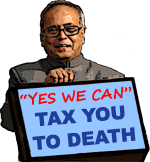
The author compliments Finance Minister Pranab Mukherjee for his deft handling of the Vodafone crises despite relentless pressure from all sides. However, now that the stage has shifted from the political arena to the legal arena, it is time to take stock of the options available to the warring parties, says the author as he evaluates the alternatives and identifies their pros and cons in a succinct manner
Vodafone, to its credit, tried very hard but, in the end, all its machinations were to no avail against Finance Minister Pranab Mukherjee’s steely resolve. Vodafone got people in very high places to put enormous pressure on the Indian government to scrap the retrospective amendments. On the political front, international heavy weights like Tom Geitherner, US Secretary of State, Gordon Brown, Finance Minister of UK and David Gauke, Chancellor of the Exchequer, expressed their strong disapproval of the amendments. On the commercial front, leading industrialists from Adi Godrej to Narayan Murthy and everyone else in between spoke out against the amendments. Even on the legal front, eminent senior counsel Soli Dastur and Dinesh Vyas expressed grave doubt about the constitutional validity of the amendments. Celebrated Senior Advocate Harish Salve lashed out at the Government in public and sent out the dire warning that the retrospective amendments would “ruin” India. Even noted economist Bibek Debroy jumped on the bandwagon and demanded that Pranab Mukherjee should “honourably” withdraw the amendments before it was too late. Pranab Mukherjee was attacked in Parliament as well by the members of the opposition.

